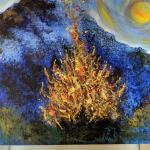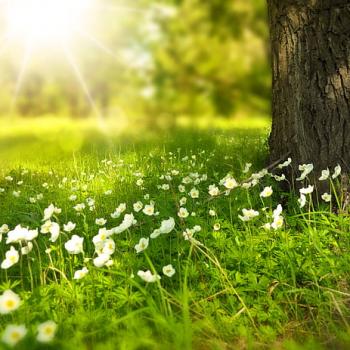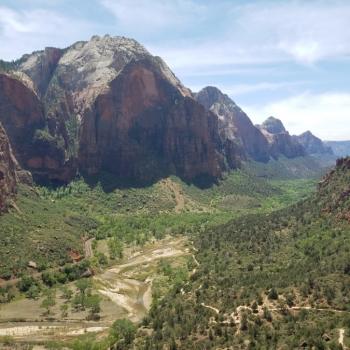My last post introduced my readers to the concept of spiritual ecology and I drew out some connections to Judaism. In this post, I want to briefly discuss how spiritual ecology can relate to nearly any religious tradition or practice.
At the core of spiritual ecology are the overlapping and intertwined insights and convictions that the natural world has spiritual meaning, that humans are embedded in the natural world, and how we relate to animals, the ecosystem, agriculture, natural resources – effects our own well being.
Spiritual ecology does not seek to take existing religious traditions and add nature-based concerns or elements, but rather, seeks to draw out the nature based elements already present and beneficial to the tradition overall. Therefore, spiritual ecology can dialog and interact with Christianity, Buddhism, Islam, and even forms of Humanism. And spiritual ecology is relevant whether one is orthodox, liberal, traditional, or whatever.
Spiritual Ecology & Holidays
Think about religious holidays for a moment. Sukkot is replete with nature-based imagery, calls us outside into the sukkah, and coincides with the time of the harvest. Scholars tend to think the origins of the holiday are deeply rooted in earlier harvest traditions and celebrations. In our modern world alienated from nature, it is too easy to neglect or even miss altogether the ecological aspects of the holiday which rather than detract from it’s deeper, spiritual meanings, enhance them.
Consider the Christian holiday of Christmas. While no one knows the exact date of Jesus’ birth, and while there are historical reasons for the holiday taking place when it does (supplanting earlier Pagan celebrations), from a Christian perspective having the celebration coincide with the Winter Solstice – the renewal of light – makes much sense. The same can be said of Hanukkah.
Part of the underlying structure of these, and many other celebrations, is nature’s cycles and rhythms. The specific timing of the holidays and festivals may vary due to culture and geographical location, but the cycles of the sun and seasons, and the corresponding agricultural events are the basis and structure for many of our enduring holidays.
A common thread is the recognition that attuning to the natural rhythms of nature can reconnect us to our place in the ecosystem and be a powerful tool for personal and spiritual transformation and growth. The seasons provide opportunity for reflection, personal accounting, and marking off significant times and events in our life. We live each day with the symbolism and metaphor of the constant progression/changing of the seasons. And yes, such things have spiritual power and significance and are not foreign or contrary to any of the world’s major religious traditions.
Spiritual Ecology & Environmental Responsibility
Religious and spiritual impulses typical call out for action in terms of personal and social change. Most religious traditions have accumulated wisdom in terms of practices and disciplines, that when engaged promote expanded awareness, focus, perspective, self examination, and self discipline. Our religious efforts, in large part, should be for self improvement and the improvement and welfare of others. The unified goals of these practices is to foster wholeness in individuals and communities.
Spiritual ecology as a religious impulse begins to suggest practices and disciplines that we can take upon ourselves to increase awareness and reconnection to others, the natural world, and therefore ourselves. We engage such practices to elevate our lives and move us toward wholeness. No spiritual practice fulfills its meaning unless it make us a better, more whole and loving person.
As we increasingly realize the potential dangers of climate change, pollution, and how many aspects of our lifestyle choices damage the environment, we also realize our moral obligations to lessen the harm we do. This recognition is not a partisan political one, it is simply the understanding that to the degree to which we harm the planet is to the degree to which we harm ourselves. There may be debate over the exact causes, corrective measures, and the like, but one cannot responsibly ignore the issues of climate change, the destruction of ecosystems, and our all too often callous attitude toward the natural world.
The thinking of spiritual ecology is that environmental concern is existential concern, that there is a moral and spiritual aspect to these issues, and that our responses will be most effective when they recognize such. Obviously, science and technology are vital and pivotal to finding solutions that will help protect the environment. But human attitudes and values must change as well, and changing human values and attitudes is, in part, a religious task.
What are your thoughts? Have you encountered ideas, books, or people into spiritual ecology? Was it a good experience?
















